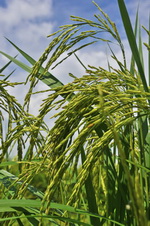
GE Rice High in Iron and Zinc Developed
February 17, 2016| |
 A transdisciplinary group of scientists from institutions in the Philippines, Colombia, Indonesia, USA, Australia, and Japan has successfully developed rice with increased levels of iron (Fe) and zinc (Zn) through biofortification.
A transdisciplinary group of scientists from institutions in the Philippines, Colombia, Indonesia, USA, Australia, and Japan has successfully developed rice with increased levels of iron (Fe) and zinc (Zn) through biofortification.
The study found that the genetically engineered rice has significantly increased levels of Fe (up to 15 micrograms) and Zn (up to 45.7 micrograms) per gram of polished rice that human cells can potentially absorb. Polished rice grains contain only about 2 micrograms of Fe and 16 micrograms of Zn per gram, and with limited variation in grain Fe content across the rice gene pool, conventional breeding efforts have not been successful in reaching 13 micrograms of Fe and 28 micrograms of Zn per gram of polished rice to fulfill 30% of the estimated average requirement (EAR) in humans.
The scientists used genes–nicotianamine synthase from rice and ferritin from soybean–that together produce high-micronutrient grains. They introduced the genes to the rice variety IR64, and bred these into other popular indica varieties, the most widely grown rice from South and Southeast Asia where Fe and Zn deficiencies are prevalent.
For more, read the article in Rice Today.
| |
Biotech Updates is a weekly newsletter of ISAAA, a not-for-profit organization. It is distributed for free to over 22,000 subscribers worldwide to inform them about the key developments in biosciences, especially in biotechnology. Your support will help us in our mission to feed the world with knowledge. You can help by donating as little as $10.
-
See more articles:
-
News from Around the World
- FAO DG: More Must be Done to Ensure Access to Agbiotech of Family Farmers in Developing Countries
- Ancient Flowering Plant Found Poisonous
- GE Rice High in Iron and Zinc Developed
- Farmer Leaders in Uganda Pledge Support for Agri Biotechnology
- Scientists Modify Plant Gene to Trick Bacterial Defense to Attack Virus
- New Study Sheds Light on Plant Evolution
- Expression of Arabidopsis L-type Lectin Receptor Kinase Genes in Tobacco Confers Phytophthora Resistance
- DPB3-1 from Arabidopsis Enhances Heat Stress Tolerance without Growth Retardation in Rice
- Government Commissioned Study Did Not Find Glyphosate in Breast Milk
-
Research Highlights
- Expression of Arabidopsis Bax Inhibitor-1 in Sugarcane Confers Drought Tolerance
- Analysis of Block of cell proliferation 1 (BOP1) Function in Strawberry and Arabidopsis
- Metabolic Engineering for Proanthocyanidin Production by Repressing Isoflavone Pathways
-
Beyond Crop Biotech
- Kiel Scientists "Shrunk" Laboratories
-
Announcements
- 7th International Crop Science Congress
-
Resources
- 'Road Movie' on Plant Resistance to Disease
-
Read the latest: - Biotech Updates (February 18, 2026)
- Gene Editing Supplement (March 4, 2026)
- Gene Drive Supplement (February 22, 2023)
-
Subscribe to BU: - Share
- Tweet
